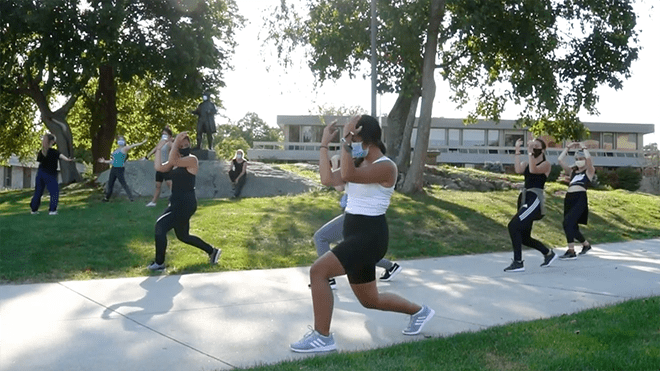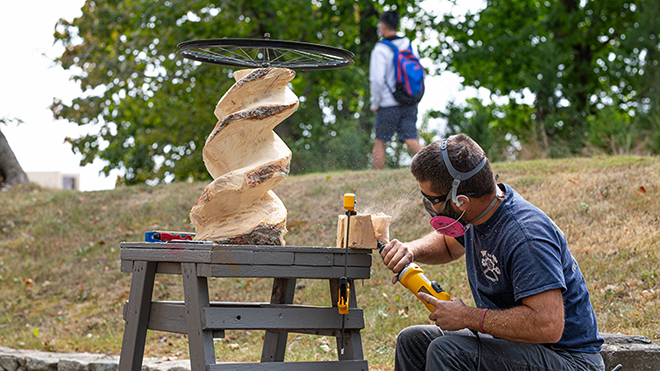From Necessity to Invention: Arts and Humanities Expand What’s Possible
RWU professors are finding new opportunities for experiential, student-centered approaches to teaching and learning across the grounds of the Bristol campus

BRISTOL, R.I. – Dance students make the Bristol campus their stage with choreography inspired by the landscape. Sculptors work outside, expanding the scale of their projects in the open air. Student actors focus on voice and expression as they prepare for a radio broadcast performance.
“The students have missed being together. We are gathering together, and shaking the norms up,” said Associate Professor of Dance and Performance Studies Cathy Nicoli.
RWU's faculty in performing and visual arts took on the challenges of teaching while adhering to social distancing requirements and turned them into opportunities to practice new, innovative approaches to their art. We recently talked with three professors about the creative ways they are adjusting their classes.
Dance
“I totally changed my curriculum to work with earth-based somatics, and I am getting more positive feedback from the students than I anticipated. I am using this as an opportunity to touch things that we couldn’t do indoors. I’m calling it free range," said Nicoli.
We are practicing on the balcony of the library, on the quad, and down by the shell path. We will be working with the parking garage, the pond, the landscape behind the performing arts center, and the tennis courts for the final performance."
I want the students to see the landscape of the campus they are working on through different eyes. The practice of site-specific work is very different than work on a black box stage. We are researching scale. It is very much like architecture, landscape design, and choreography all at once.
It’s really changing the learning curve of the dancers and choreographers because the scale is huge. It feels more athletic. It is installational art. It’s a totally different experience.
The students dig this. They ask me if we can keep doing it. Now that we’ve proved we can do it out of necessity, we can do it out of choice going forward.”
Sculpture

"We had always thought and talked as a department about having an outdoor sculpture yard. Because of COVID, we decided to take the first step, so students can work outside when the weather is good," said Professor of Art Elizabeth Duffy.
"We have two structures that are basically really nice carports, so we can roll our tables on casters right out the door of the sculpture area and students can work outside. We are doubling our work space. We are hoping this will grow into a full sculpture yard. We are really excited.
When you’re working outdoors, scale can change. Students can work larger than life size. Things that are noisy, like chiseling and hammering, are less intrusive outdoors than in a small space. Just being in nature and having the conversations with students that walk by and are enhances the work environment for the students.
We hope it will raise the profile of the fine arts on campus. Students will be fascinated to see students working outside, and hopefully that will compel them to want to take an art class."
Theatre
"I thought, what about radio shows? That’s a good opportunity. That way we can still do performances," said Professor of Theatre Robin Stone.
"We’re doing a radio show, 'The War of the Worlds'. We will have six actors with their stations on stage, wearing masks and using microphones. It’s written for the radio, so there is no movement necessary.
With the configuration of the theater, we can have six performers on stage and thirteen people in the audience with everyone distanced. The only people who can be in the audience are RWU students, faculty, and staff who are being regularly tested. We have been working with MediaTech and we are going to livestream the performance, so friends and family and community members can watch online.
We are approaching it as a radio broadcast, where the actors are in a studio, they have their scripts, and they make sound effects. It’s a different way of approaching character. It’s for listeners, not for viewers, even though people will be viewing. The voice and vocal expression becomes way more important than physical expression.
I’ve never done that before as an educator. I’m always looking at the picture, how people are moving and gesturing, but now I can really focus on the vocal quality."
'The War of the Worlds' opens October 2
Faculty: Do you have a story of innovative teaching and learning during the pandemic? Email us at stories@rwu.edu